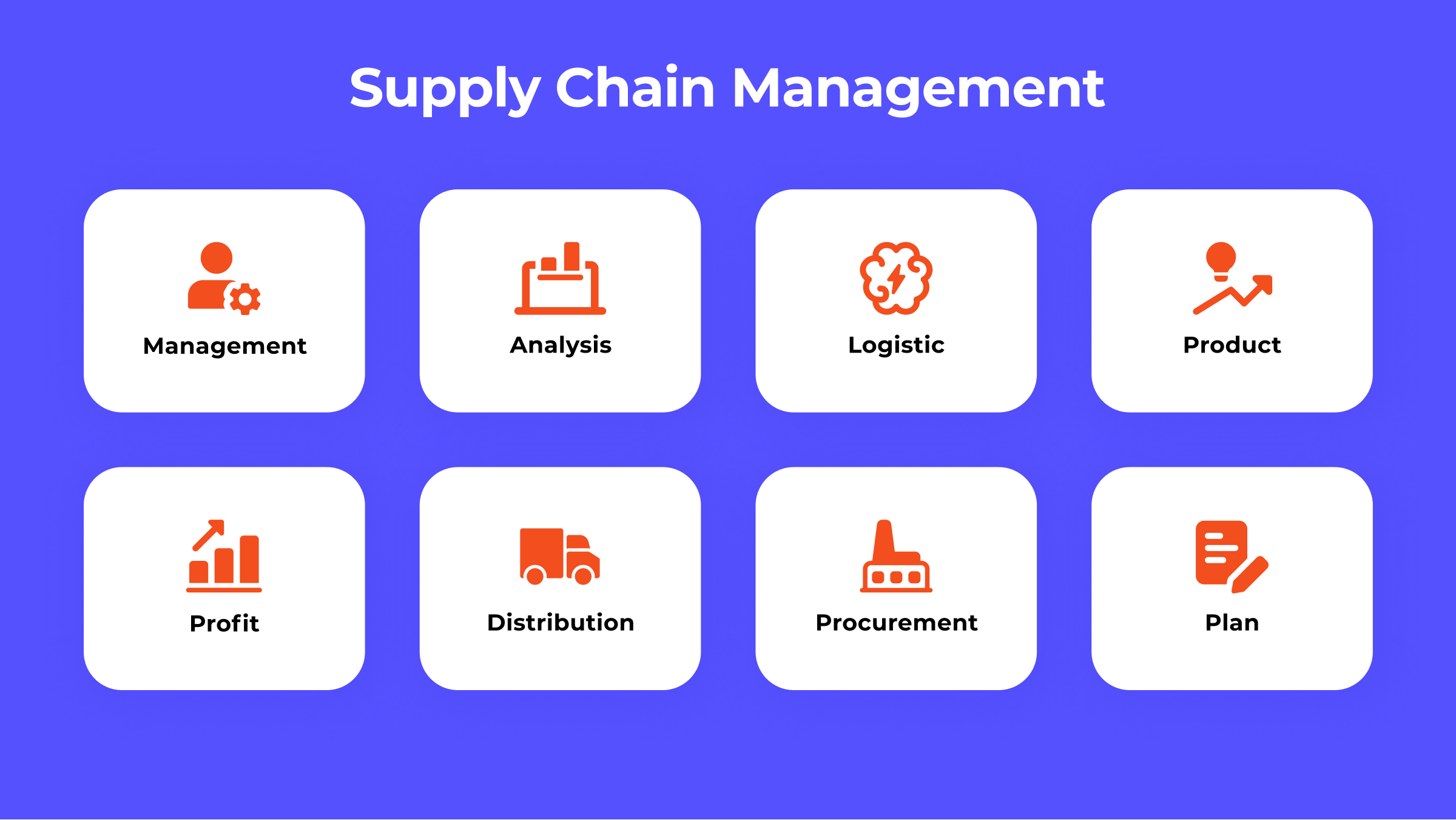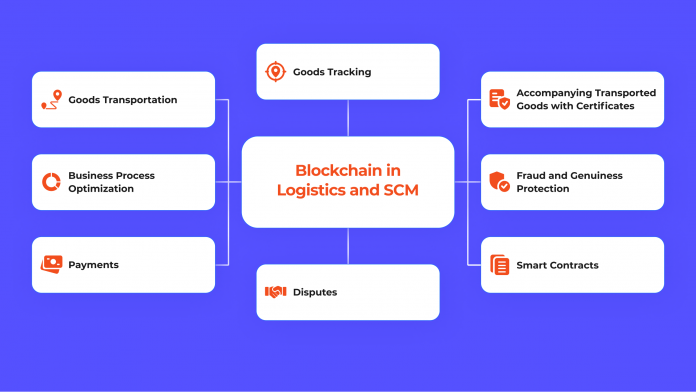By Vitaly Kuprenko
Today, the introduction of modern technologies to improve the work of the logistics business is the key to its survival and development in the ever-growing competition. Modern technologies aim to optimize many business processes, making both internal work more efficient and customer-oriented processes more convenient. One of these technologies is blockchain, which is being actively implemented in logistics and supply chain management. In this article, we’ll take a closer look at six major ways blockchain technology can reform the logistics industry and the benefits of this technology for business. So, without further ado, let’s get started.
Why Blockchain Is a Breakthrough?
Blockchain would not have become as popular in this industry if it had been a run-of-the-mill technology without distinctive features. Blockchain makes it possible to track and record every transaction between parties, and in our case, these are entire businesses and suppliers. And according to analysts, the introduction of such a solution into the work processes of the logistics business can reduce barriers in the supply chain management by 15%. As a result, many popular companies want to get such a powerful benefit in their arsenal, and Amazon, Walmart, Unilever, Nestlé have already implemented blockchain in their processes.
In addition, blockchain has become a real breakthrough since it prevents inaccuracies and fraud. Also, do not forget about the significantly reduced amount of paperwork.
Blockchain Benefits in Logistics
Blockchain requires a thoughtful and lengthy implementation process, but in return, it rewards businesses with a high level of trust between the parties to the delivery of goods since everyone has access to important information in real-time. This is easily applicable in areas such as:
- Transportation of goods
- Optimizing routes
- Fleet management software development
- Fraud detection
- Making secure payments and much more
So let’s take a closer look at the main benefits of this technology in logistics.
Benefit #1. Reducing Paperwork
Document flow is the cornerstone of the logistics business and one of the things that cause headaches for many entrepreneurs. The more documents need to be processed, the more difficult the work becomes for all parties to the transaction. In addition, when working with ordinary documents, there is a high risk of forgery or loss of securities.
The workflow also imposes certain costs on the business. For example, the cost of processing trade documents varies from 15% to 50% of the cost of transporting materials. And blockchain is designed to solve all these problems.
Blockchains can connect wide networks and establish reliable relationships between shipping companies and customs, thereby dramatically reducing paperwork and reducing the risk of fraud.
Benefit #2. Simplified Control of the Goods Origin
Many buyers are seriously concerned about the originality of their products and are more negative about low-quality counterfeits of more successful brands. And blockchain can guard the originality of goods, helping to track the supply chain and documentation.
For example, the supply of medicines that are especially vulnerable to counterfeiting, which can cause both financial and reputational losses with a threat to the lives of ordinary customers. Blockchain can provide transparency in the supply chain from manufacturer to pharmacy by identifying barcodes. This makes it harder to counterfeit goods or sell counterfeit drugs.
Benefit #3. Food Supplies Control
Another industry that benefits from blockchain adoption is the food supply. Foodborne disease outbreaks cause millions of dollars in losses and colossal reputational losses, and in order to avoid them, sellers must control suppliers of goods.
![]()
For example, the American retail giant Walmart has implemented a blockchain ledger in its processes that helps to make the food supply as transparent as possible. The most interesting thing is that this technology is much more efficient than standard barcodes, both in the speed of determination and accuracy.
Ways of Blockchain Use in Logistics
In order for you to have a complete picture of how blockchain improves businesses every day, we have collected 6 well-known use cases of using this technology in logistics.
1. FedEx
It’s no secret that FedEx is one of the largest companies providing delivery and transportation of various goods around the world. And as with any delivery, sometimes there are some disputes with customers. And for a simpler solution, the company has developed and implemented a special blockchain-based system to solve the problems of customers (unfortunately, more accurate information about the principle of operation is not known since it is a commercial secret). In addition, the company plans to use blockchain for record storage and strategic analysis.
2. Walmart
We’ve already mentioned Walmart in this article, but let’s take a closer look at how they are using blockchain in their business. The company has implemented this technology to ensure the supply of safe and original products to store shelves. All products undergo several tests through various sensors that read temperature and other environmental indicators. All this complex system was created to ensure that fresh products arrive in stores.

3. ZIM
ZIM is one of the largest sea carriers, and to improve its processes. It recently launched a blockchain system for digitizing landing invoices. These documents are extremely important as this is a contract for shipping containers containing all important information, including shipping details, destination, quantity, and handling instructions.
4. Shipchain
A California-based startup that has developed a sophisticated blockchain-based system to support a continuous delivery process, namely the constant transfer of up-to-date cargo location data to all parties.
5. Chronicled
Another Californian startup focused on optimizing B2B trading through its own blockchain-based solution. They built their decentralized network and blockchain-based supply chain protocols to improve global commerce.
6. FFF Enterprises
This company is a fairly large pharmaceutical distributor and uses blockchain in their custom MediLedger Network platform. This platform was created with the aim of automated verification of the return of marketed drugs.
Drawbacks of Blockchain in Logistics
Despite all the strengths of blockchain, there are some disadvantages that you should also be aware of.
For example, the technology itself is not yet fully learned and, as a consequence, the development is also not 100% complete. As a result, various changes are still awaiting this technology, and no one yet knows what they might be.
In addition, this technology suffers from some performance issues, namely slowdowns every time the registry is updated and distributed. For this reason, analysts do not yet recommend adapting the blockchain for large-scale production.
Wrapping Up
As you can see, blockchain is truly a breakthrough in the field of logistics and supply chains. This technology brings process automation and significant improvement in transaction security to a business that depends entirely on it. And over time, this technology will only improve and bring new opportunities to implement various solutions in this area.
About the Author
 Vitaly Kuprenko is a writer for Cleveroad. It’s a web and mobile app development company with headquarters in Ukraine. He enjoys writing about technology and digital marketing.
Vitaly Kuprenko is a writer for Cleveroad. It’s a web and mobile app development company with headquarters in Ukraine. He enjoys writing about technology and digital marketing.
Disclaimer: This article contains sponsored marketing content. It is intended for promotional purposes and should not be considered as an endorsement or recommendation by our website. Readers are encouraged to conduct their own research and exercise their own judgment before making any decisions based on the information provided in this article.




























![“Does Everyone Hear Me OK?”: How to Lead Virtual Teams Effectively iStock-1438575049 (1) [Converted]](https://www.europeanbusinessreview.com/wp-content/uploads/2024/11/iStock-1438575049-1-Converted-100x70.jpg)




